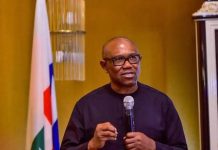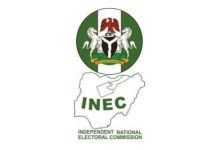A Chieftain of the All Progressives Congress (APC) in Oyo State, Asiwaju Rotimi Ajanaku has advised the governments of the two african economic leading nations, Nigeria and South Africa to weigh the consequences of the looming face-off that’s likely to follow the latest xenophobic attack in South Africa and take proactive precautions without further delay.
In a Press Release signed by Asiwaju Ajanaku and made available to journalists on Tuesday through his media consultant, Adebowale Adeoye in Ibadan.
Asiwaju said he was one of those that rose against barbaric act perpetrated by some disgruntled elements who attacked foreigners in South Africa two weeks ago.
He also agreed that the decision of people all over the country to speak with one voice against the attack yielded positive results and equally forced South Africans to cease fire.
“If we had kept quite to the incessant killings of our people things would have gone out of control by now, our actions have yielded good and encouraging results.
“We initially called for sanctions against SA and her citizens when they appeared unrepentant in their attack against Nigerians and other Africa nationalities and the response from the federal government then seemed unsatisfactory.”
“Nigerian government felt pressured to act and subsequently recalled its ambassador from Pretoria and pulled out of the World Economic Forum meeting on Africa which was held in Cape Town.
“Also encouraged and supported bringing back Nigerians who have faced danger in South Africa. On the other, South Africans have also started trooping out in large numbers appealing to foreigners for forgiveness, likewise government of South Africa has sent delegates to countries whose citizens were affected by the attacks.
“Based on this development there is need for stocktaking to determine the damage level, assessment of economic effects (advantages and disadvantages) of going into Cold War with South Africa.”
“There is urgent need by the presidents of the two countries to come out strong to signal intention to end ugly incident threatening their togetherness and make public declaration not to harm relations with each other. The two giants of African economies should see themselves as allies and willing to keep the relationship that in many ways has produced good results.
“There is an existing binational commission between the two countries which should be used to reshuffle their cards to avoid reoccurrence of xenophobia and other diplomatic rancours. Proper investigation should be carried out to identify the major culprits and subsequently place very heavy and massive sanctions on them.
Asiwaju said Nigeria should consider its economic situation, state of insecurity and other various problems affecting lives of over 160 millions of its population in its decision on South Africa.
Hee said interdependency of the two nations contributed greatly to the existing rivalry between them, he said “Nigeria cannot afford to go into any form of war with any country now, not now that insurgency, kidnapping, communal clashes, corruption and unemployment have weaken the economy of our great country and subjected Nigerians to avoidable hardship.
“When you look at situation in South Africa, it is not better. The blacks majority that dominated the population of South Africa are lacking behind educationally, and this is having untoward effect on the economy of South Africa. Most of them are unskilled labours, yet they are holding key positions in most of their organization. Corruption is on increase in South Africa and part of what led to recent xenophobic cases.”
Asiwaju made reference to Donald Trump statement on why he did not go to war with Saudi Arabia on Khashoggi case, he said “Like Donald Trump in his decision to stand with Saudi Arabia despite global criticism that followed the assassination of Washington Posts Journalist, Jamal Khashoggi, who was allegedly murdered by the Saudi prince. Trump said ‘after my heavily negotiated trip to Saudi Arabia last year, the Kingdom agreed to spend and invest $450 billion in the United States.
“This is a record amount of money. It will create hundreds of thousands of jobs, tremendous economic development, and much additional wealth for the United States. Of the $450 billion, $110 billion will be spent on the purchase of military equipment from Boeing, Lockheed Martin, Raytheon and many other great U.S. defense contractors.
“If we foolishly cancel these contracts, Russia and China would be the enormous beneficiaries – and very happy to acquire all of this newfound business. It would be a wonderful gift to them directly from the United States!’ National interest should supersede individual or group interest.”
Asiwaju went further to quote in figure the business relationship between South Africa and Nigeria in 2018.
“According to United Nations Comtrade Database on international trade, Nigeria Imports from South Africa during 2018 was US$514.3m (plastics 23%, Machinery, Nuclear Reactors, Boilers 10%; Mineral Fuels, Oils, Distillation Products 9.3%; Vehicles other than Railway, Trainway 7.6%); while Nigeria Exports to South Africa was US$3.98 Billions with Mineral Fuels, Oils, Distillation Products standing at 99.9%.
“You will agree with we that caution must be applied in handling xenophobia issue with South Africa. Get me right, that is not to say Nigeria should be taking for granted.”
“Government should continue to make all possible efforts to protect Nigerians abroad and also be concerned about the activities of Nigerians living abroad, take actions when it is necessary.
“There is need to protect our business interest with other nations, especially now that nigeria is yet to find its feet. For instance, Trump concluded his statement by saying ‘I understand there are members of Congress who, for political or other reasons, would like to go in a different direction – and they are free to do so.
” I will consider whatever ideas are presented to me, but only if they are consistent with the absolute security and safety of America. After the United States, Saudi Arabia is the largest oil producing nation in the world. They have worked closely with us and have been very responsive to my requests to keeping oil prices at reasonable levels – so important for the world.
“As President of the United States I intend to ensure that, in a very dangerous world, America is pursuing its national interests and vigorously contesting countries that wish to do us harm. Very simply it is called America First!’ Let me put it this way that whatever will add to the current hardship that an average Nigerian is going through now must be avoided.”
“It has been discovered that the intrusion of foreign migrants into vulnerable communities (in South Africa) beset by joblessness and despair inevitability produces a tinderbox that sparks violence. That is why Migrants are easy targets. That is because they are seen as being better off by the locals. They therefore become targets of people who feel their circumstances have not been addressed by government.”
“The two nations should know that reforms are urgently needed to create a competent, less corrupt, better-resourced, and civic-minded police and immigration services, as well as anti grafts agencies. Efficient border controls are one of the hallmarks of sovereignty and the first line of defence against xenophobia. Broken borders breed criminality. Human and drug trafficking feature prominently in the discourse on xenophobia in South Africa,” Asiwaju added.
“Immigration policies between the two countries must be critically reaccessed and reviewed. The newly-inaugurated AU Free Movement of Persons Protocol will certainly not work or implemented if South Africa and Nigeria do not support by participating in it to make it reality.”
“Also, without the leadership of its two major economies, Africa is not going to make any traction on the new treaty establishing the African Continental Free Trade Agreement. Ironically, the WEF meeting in Cape Town boycotted by Nigeria because of xenophobia was to address ways to boost intra-African trade. unfortunately it was boycotted to resist further attack on Nigerians, this will surely affect both countries as well as other nations that depended on them.” Asiwaju Ajanaku advised.








